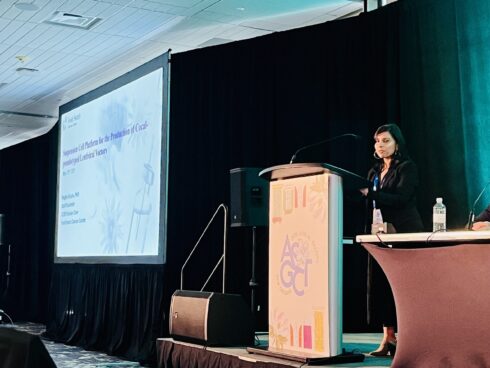ASGCT Meeting – New Orleans, May 2025
Presentation by Megha Gupta, Lab Manager, CCEH-Cell Manipulation Tools Core/Vector Production
Title: Suspension Cell Platform for the Production of Cocal-pseudo Typed Lentiviral Vectors
ABSTRACT: Cocal-pseudotyped lentiviral vectors offer significant advantages for ex vivo engineering of hematopoietic stem cells (HSCs) and T cells, as well as in vivo gene delivery. Compared to their VSV-G counterparts, Cocal-pseudotyped vectors demonstrate broader species and cell tropism, enhanced serum stability, and reduced serum neutralization in patient samples. Furthermore, their significance in in vivo gene therapy is emphasized by the studies conducted by Hans-Peter Kiem’s group and Umoja Biopharma in dog and NHP models, respectively, using Cocal-pseudotyped lentiviral vectors. However, therapeutic potential of viral vectors is often hindered by low-yield manufacturing processes.
As a proof of concept, we developed a robust and scalable suspension-cell platform to produce third-generation Cocal-pseudotyped lentiviruses. Using commercially available producer cells that grow in chemically defined serum free media, we optimized production conditions to enhance viral yield. 0.5ug of total plasmid DNA per million cells was used for PEI-mediated transfections, leading to reduction by 80% when compared with the total DNA that was used for vector production using adherent cells. A single harvest at 56 hours post-transfection, followed by concentration, yielded viral titers that were twice as high as those obtained from adherent producer cells. The suspension cells produced vector until passage 60-65 enabling 20 cycles of production, after which the cell viability started declining.
Transduction experiments revealed no evident cellular toxicity. Functional and physical titrations indicated a higher infectivity index for Cocal-pseudotyped lentiviral vectors compared to VSV-G equivalents. Notably, scaling up production from 20 mL to 200 mL cultures maintained both viral titers and infectivity.
These findings highlight the potential of this scalable suspension-cell platform to enable high-yield production of Cocal-pseudotyped lentiviral vectors, offering a viable solution for therapeutic applications in gene therapy.







